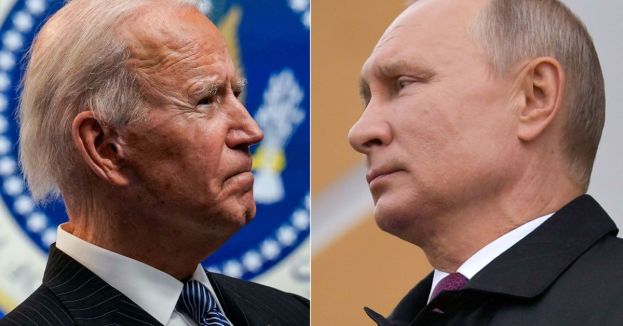Despite facing sanctions and forced isolation from the West following its invasion of Ukraine in February 2022, Russia's economy is recovering, and the Russian government continues to enjoy the trust of its citizens as the war against Ukraine persists.
In response to the invasion, Western nations imposed or expanded sanctions on Russia, resulting in over $300 billion in frozen Russian banking assets as of October, according to the European Council.
WATCH: BRITISH COLONEL RICHARD KEMP REPORTING FROM GAZA![]()
December 04, 2023
The Biden administration has maintained its sanctions against Russia, aiming to hold it accountable for its aggression, and Congress has approved approximately $100 billion in aid to Ukraine since the start of the war.
WATCH: NO CLUE WHY THEY ARE PROTESTING: "I WISH I WAS MORE EDUCATED"![]()
President Joe Biden expressed optimism about the potential impact of united European action against Russia, stating, "Imagine what happens if we, in fact, unite all of Europe, and [Russian President Vladimir] Putin is finally put down where he cannot cause the kind of trouble he's been causing."
TRUMP READY TO DEBATE BIDEN 'ANYWHERE, ANYTIME, ANYPLACE,' BUT WILL IT HAPPEN?![]()
December 04, 2023
However, despite these efforts, Russia's economy appears to be recovering from its forced isolation. Western nations imposed a price cap of $60 per barrel on Russian oil exports, but Russia has managed to increase its oil and fossil fuel exports to countries like China and India.
CRITICS SLAM BIDEN'S ATTEMPT TO RELATE PERSONAL TRAGEDY TO POLICE OFFICER DEATHS![]()
It has also found ways to bypass sanctions and continue shipping oil to the European Union through intermediary countries. The $60 price cap has proven largely ineffective, with more than 99% of oil traded well above the ceiling.
Russia's focus on bolstering its economy domestically has involved replacing global brands that left the country with Russian equivalents. For example, McDonald's was replaced with the Russian counterpart "Vkusno i Tochka," Starbucks with "Stars Coffee," and IKEA with "Swed House," a Belarusian furniture company.
FROM DISGRACE TO REDEMPTION: DAN RATHER TO MAKE UNEXPECTED RETURN TO CBS![]()
Additionally, many brands that pulled out of Russia are still available through cross-border shipping or online marketplaces. Overall, the consumer experience in Russia remains relatively stable, although prices for some goods may be higher.
KARMA IS A B*TCH: COUNCIL MEMBERS WHO CRITICIZED NYPD NOW BEGGING FOR THEIR PROTECTION![]()
Russia's defense industry has also played a significant role in driving its economy, particularly in the ongoing war with Ukraine. Defense spending is expected to account for 6% of Russia's GDP in 2024, compared to 3.9% this year.
Despite initial predictions of a 2.5% drop in Russia's GDP for 2023, the IMF revised its forecast in October to an increase of 2.2%. Global imports rose by approximately 8% in 2023, while exports remain low.
BOMBSHELL REPORT: THE SECRET PLOT TO OUST KARINE JEAN-PIERRE![]()
Despite the economic challenges, the Russian public's confidence in Putin and the war against Ukraine has remained high, consistently above 70%, according to data from the Russian pollster Levada Center. Approval of Putin increased from around 71% in February 2022 to 85% in November. However, the validity of some of this polling is uncertain, as there are risks associated with protesting against the Kremlin from within Russia.
SECRET SERVICE SHENANIGANS: VP HARRIS' BRAWLING BODYGUARD STORY TAKES A TWISTED TURN![]()
Russian attitudes toward the United States and the European Union remain negative, with approximately 60% expressing unfavorable views, according to the Levada Center. Putin has blamed the Biden administration and its Western allies for the conflict in Ukraine, as well as the Israel-Hamas war and subsequent conflict in the Middle East.
The Russian public's confidence in Putin and support for the war remains high, although the validity of some polling data is uncertain. Russian attitudes toward the United States and the European Union remain negative.








 Discover alternative ideas that will make you think
Discover alternative ideas that will make you think Engage in mind bending debate
Engage in mind bending debate Earn points, rise in rank, have fun
Earn points, rise in rank, have fun


